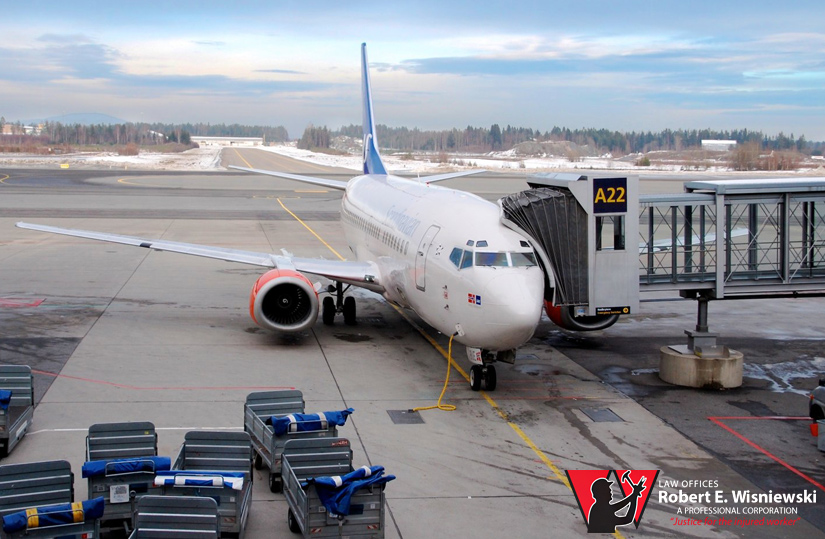What to do after you’ve been hurt on the job in an Arizona airport
The Phoenix Sky Harbor International Airport (PHX) is a popular airport for travelers from all around the world. In recent decades, the airport has expanded immensely as the city of Phoenix has grown.
Current figures estimate that around 46 million passengers travel through Phoenix Sky Harbor International Airport on a yearly basis. This volume of passengers and flights is made possible by the army of around 31,000 people who work at PHX—and it’s estimated that another 300,000 jobs are created by the existence of the airport in surrounding industries. Phoenix Sky Harbor International Airport is also the main hub for U.S. Airways (which is now owned by American Airlines).
At the Law Offices of Robert E. Wisniewski, we are grateful for the hard work of Arizona’s airport workers. We want airport employees to understand that you are entitled to receive funds from workers’ compensation if you are hurt at work. Consulting an attorney about your work injury case is the best way for you to get answers and justice for what happened to you.
How workplace injuries and accidents happen at airports
Airport employees face unique risks and potential hazards in their workplace. With the bustling environment and the variety of tasks performed, it’s no surprise that accidents and injuries can occur in myriad ways.
Here’s a breakdown of some roles and their associated risks:
- Baggage Handlers: They work with conveyor belts, automated systems and manually load and unload luggage. Their hands or limbs can get caught and crushed in the machinery or between heavy bags.
- Ground Crew: These employees are responsible for guiding airplanes during landing, takeoff, and taxiing. They work in close proximity to aircraft and heavy vehicles. They can be crushed between these large objects or by moving parts of the plane like landing gears or flaps.
- Maintenance and Repair Staff: These workers service and repair airport equipment and vehicles. They can suffer crush injuries if a piece of equipment malfunctions, if a vehicle or object falls onto them, or if their body parts get caught in machinery.
- Construction Workers: Airports often undergo construction or renovation. Workers in these areas can be crushed by falling objects, heavy construction equipment, or collapsing trenches or structures.
- Cargo Handlers: Workers who load and unload cargo are at risk. They can be crushed by heavy cargo or between cargo and aircraft walls or cargo handling machinery.
Other hazards include confrontations with unruly passengers or being struck by moving vehicles or equipment.
Given these numerous potential injury sources, all airport employees must understand their legal rights in addition to safety training, proper equipment, and adherence to safety protocols.
This knowledge can prove invaluable in receiving the necessary support and compensation in the event of a serious workplace accident.
In the news:
Disruptive Airline Passenger Fined
$42,000 against a passenger on a May 16, 2021, jetBlue Airways flight from Queens, N.Y., to San Francisco, Calif., for allegedly interfering with crewmembers after failing to comply with the facemask mandate; making non-consensual physical contact with another passenger; throwing a playing card at a passenger and threatening him with physical harm; making stabbing gestures towards certain passengers; and snorting what appeared to be cocaine from a plastic bag, which the cabin crew confiscated.
The passenger became increasingly agitated and the crew equipped themselves with flex cuffs and ice mallets to ensure the safety of the flight if his behavior worsened. The flight diverted to Minneapolis, Minn., where law enforcement removed the passenger from the aircraft.
Source: https://www.faa.gov/newsroom/faa-fines-against-unruly-passengers-reach-1m
What to do if you’re injured while working at an Arizona airport
The first and most important thing to do when injured on the job is to seek immediate medical attention. There is no point in letting an injury get worse or fester; and besides, you will need to show that you sought immediate medical treatment for your injuries if you hope to file a successful workers’ compensation claim. It will hurt your case if you don’t seek medical help as it gives the insurance a reason to deny your claim.
Next, you should reach out to a workers’ compensation attorney. Our attorneys can help you figure out what steps to take next in regard to your injuries and collecting information to present to the court. It is also important to have all of your medical records as well as any other relevant information (such as witness statements) to go along with it.
The collection of data and information is time-sensitive and must begin immediately. This documentation will make or break your case in court, which is why it is such a big deal to get it right from the start.
Questions and answers about compensation for a job-related accident, injury or illness in Arizona
Workers’ Comp Benefits for Injured Hotel Workers
Were you injured while working at a hotel in Arizona? Learn the steps required to file a workers’ comp claim and get maximum compensation.
What NOT to do after a workplace accident or injury
Do not speak with representatives from the airport except through your attorney. Your employer may attempt to negotiate a settlement with you to get themselves off the hook for additional liability. You are best served by letting them only speak to your attorney. Your attorney will do the talking for you and can steer away from any subjects that don’t work in your favor.
You should also refrain from making any statements out of anger or other emotion as such statements may be used against you later. The best thing to do is to stay quiet about the situation until your attorney is prepared to speak on your behalf.
Finally, do not wait too long to file a claim or assume that your injury is not serious enough to warrant a workers’ compensation claim. Waiting too long may close the window of time that you have to file a claim, per the state’s statute of limitations. Assuming that your injury is not serious enough to file a claim may leave you open to an additional injury down the road that you were not expecting.





